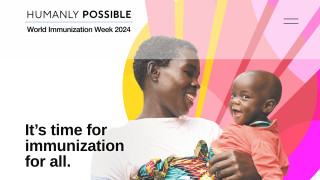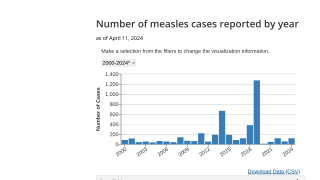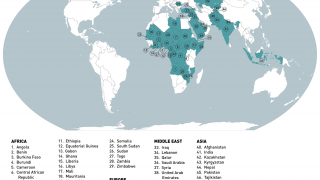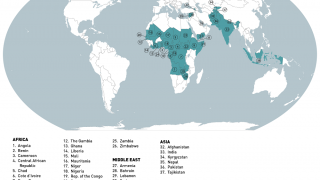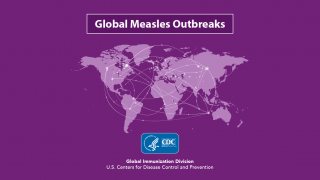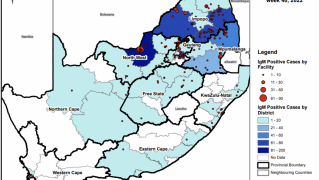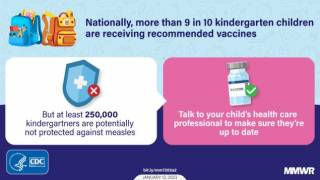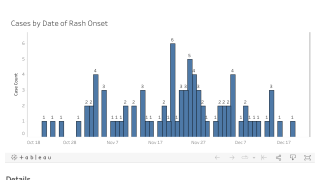76% More Measles Cases Confirmed in One Month

Since the September 25, 2019 measles update, there has been a 76 percent increase in the total number of confirmed cases of measles reported by the Pan American Health Organization (PAHO).
As of the November 1st PAHO report, the countries of Argentina (26), Brazil (4,828), Colombia (9), United States (9), and Venezuela (71) have reported the most cases in the Americas.
In Brazil, between Ending Week 1 of 2018 and Ending Week 42 of 2019, a total of 54,795 suspected measles cases have been reported, including 12 deaths in 2018 and 14 related deaths in 2019.
Within Brazil, the state of São Paulo has reported 37,757 measles cases during 2019.
This is unfortunate news given the results of a recent study that confirmed ‘the measles infections in children can eliminate the immune system’s memory to fight off other illnesses'.
This means an immune system reduction can leave about 40 percent of children who recover from measles infection vulnerable to other pathogens that they might have been protected from, before their bout with measles.
Given the number of imported measles cases from other World Health Organization (WHO) regions, both the PAHO and the WHO reinforces the recommendations made since February 2015, to take the following actions:
- Vaccinate to maintain homogenous coverage of 95% with the first and second doses of the measles, mumps, and rubella (MMR) vaccine in all municipalities.
- Vaccinate at-risk populations (without proof of vaccination or immunity against measles and rubella), such as healthcare workers, persons working in tourism and transportation (hotels, airports, border crossings, mass urban transportation, and others), and international travelers.
- Maintain a vaccine stock of the measles-rubella (MR) and/or MMR vaccine and syringes/supplies for prevention and control actions of imported cases.
- Identify migratory flows, both external (arrival of foreigners or persons from the same country who visit countries with ongoing outbreaks) and internal (displaced populations) within each country, including indigenous populations and other vulnerable populations, in order to facilitate access to vaccination services according to the national scheme.
- Implement a plan to immunize migrant populations in high-traffic border areas, prioritizing those considered at-risk, including both migrants and local residents, in these municipalities.
Additionally, PAHO/WHO recommends that Member States advise all travelers aged 6 months and older who cannot show proof of vaccination or immunity, to receive the MMR vaccine at least 2-weeks prior to traveling to areas where measles transmission has been documented.
<< Measles Immunity Test >>
To help international travelers make informed pre-trip decisions, the US Centers for Disease Control and Prevention (CDC) updated its various Travel Alerts, as of November 3, 2019.
In the USA, a total of 1,250 measles cases have been reported, as of October 4, 2019. The measles outbreaks associated with the state of New York accounted for about 75 percent of all cases, said the CDC.
According to a recent study, ‘measles cases in unvaccinated adults played a critical role in importing the disease and transmitting measles in the early stages of the New York outbreak.’
“These data strongly support current recommendations of 2 doses of the MMR vaccine for adults traveling internationally and at high-risk, such as those in outbreak areas,” the authors conclude.
Furthermore, a recent commentary published in The Lancet discusses the long-term immunity related to early vaccinations intended to protect infants from the measles virus.
This editorial indicates a 3-dose measles vaccine schedule may be needed in ‘outbreak zones.’
The CDC says measles can be prevented with 2-doses of the MMR-II vaccine. And, children have the option of getting the Proquad vaccine, which protects against measles, mumps, rubella, and varicella.
The MMR vaccine’s side effects are generally pain/redness/swelling at the injection site, fever, and a mild rash may occur. Infrequently, temporary symptoms such as fainting, dizziness, lightheadedness, vision changes, numbness/tingling, or seizure-like movements have happened after vaccine injections.
And the adverse events include but are not limited to Panniculitis; atypical measles; fever; syncope; headache; dizziness; malaise; irritability.
Measles is caused by a highly contagious virus, measles is a disease that spreads from person to person by breathing, coughing, or sneezing. People can spread measles up to 4 days before and 4 days after they have a rash.
Additionally, you can easily enroll in a free Travel Alert newsletter to receive the latest news from countries around the globe.
Measles vaccine news published by Vax-Before-Travel
Our Trust Standards: Medical Advisory Committee




